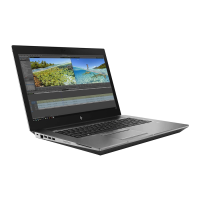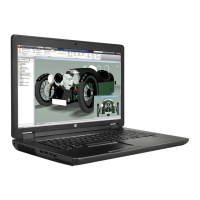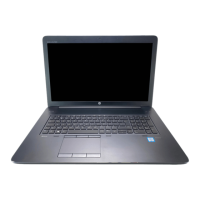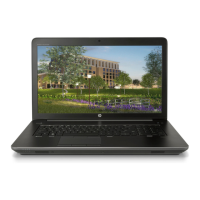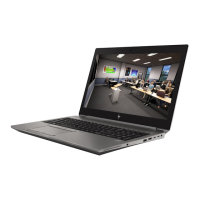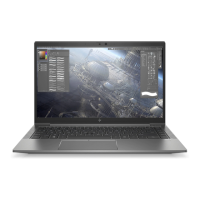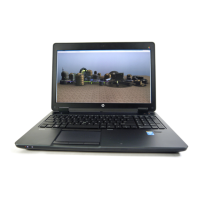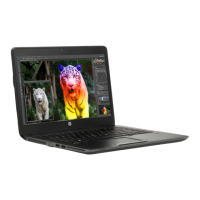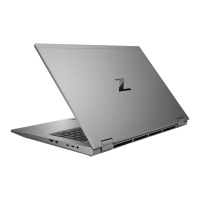
Do you have a question about the HP ZBook Fury 17 G7 and is the answer not in the manual?
| Processor | Intel Core i9-10885H |
|---|---|
| Graphics | NVIDIA Quadro RTX 5000 |
| Display | 17.3-inch diagonal, UHD (3840 x 2160), IPS, anti-glare |
| Memory | Up to 128 GB DDR4-3200 ECC or non-ECC SDRAM |
| Operating System | Windows 10 Pro |
| Battery | 8-cell, 94 Wh Li-ion polymer |
| Ports | 2 x USB 3.1 Gen 1, 2 x USB Type-C Thunderbolt 3, HDMI 2.0, RJ-45, Mini DisplayPort 1.4, headphone/microphone combo |
| Wireless | Intel Wi-Fi 6 AX201 (2x2) and Bluetooth 5 Combo, vPro |
| Weight | Starting at 6.08 lb (2.76 kg) |
Details the various components of the computer, including right-side, left-side, display, keyboard, and touchpad.
Identifies and describes components located on the right side of the computer, such as memory card reader and HDMI port.
Identifies and describes components located on the left side of the computer, such as network jack and USB ports.
Details the components related to the display, including antennas, camera, microphones, and privacy cover.
Provides information about the keyboard area of the computer.
Details the touchpad components, settings, and functionality.
Identifies and describes components located on the bottom of the computer, such as vents and service door latch.
Describes the components found on the top cover of the computer, such as the internal microphone.
Identifies and describes components located on the rear of the computer, such as vents.
Explains the location and components of service labels on the computer.
Explains the HP TamperLock security application and its implications for service.
Provides step-by-step instructions for inserting a SIM card into the service bay.
Identifies major computer components and provides information on obtaining current part details.
Lists the necessary tools for performing component removal and replacement procedures.
Outlines important considerations and precautions for disassembly and assembly procedures.
Provides guidelines for proper grounding when working on computer components.
Explains the risks of static discharge and precautions to prevent damage to components.
Details how different activities generate varying amounts of static electricity.
Lists precautions for preventing static electricity damage to electronic components.
Describes methods and equipment for personal grounding to prevent ESD.
Provides precautions for preventing static damage at the work area.
Provides instructions for removing and replacing computer components.
Details the steps required to prepare the computer for disassembly.
Provides instructions and illustrations for removing the service cover.
Details the procedure for removing and replacing the computer battery.
Provides instructions for removing solid-state drives 3 and 4.
Details the procedure for removing and replacing the hard drive.
Provides instructions for removing and replacing the WLAN module.
Details the procedure for removing and replacing the WWAN module.
Provides instructions for removing and replacing solid-state drive 2.
Details the procedure for removing memory modules 2 and 4.
Provides instructions for removing memory modules 1 and 3.
Details the procedure for removing and replacing the keyboard.
Provides instructions for removing and replacing the SD card board.
Details the procedure for removing and replacing the fingerprint reader module.
Provides instructions for removing the hard drive cable.
Details the procedure for removing the touchpad cable.
Provides instructions for removing and replacing the touchpad.
Details the procedure for removing the NFC module cable.
Provides instructions for removing the NFC module.
Details the procedure for removing the card reader board.
Provides instructions for removing the fan and heat sink assembly.
Details the procedure for removing and disassembling the display assembly.
Provides instructions for removing the beam connector.
Details the procedure for removing the graphics card.
Provides instructions for removing the system board.
Details the procedure for removing the RTC battery.
Provides instructions for removing the I/O board.
Details the procedure for removing the speakers.
Outlines component replacement procedures for authorized service providers.
Details preparation steps for authorized service provider disassembly.
Provides instructions for authorized removal of the bottom case.
Details the procedure for authorized removal of the SD card board cable.
Provides instructions for authorized removal of the SD card board.
Details the procedure for authorized removal of the fingerprint reader module cable.
Provides instructions for authorized removal of the fingerprint reader module.
Details the procedure for authorized removal of the hard drive cable.
Provides instructions for authorized removal of the touchpad cable.
Details the procedure for authorized removal of the touchpad.
Provides instructions for authorized removal of the NFC module cable.
Details the procedure for authorized removal of the NFC module.
Provides instructions for authorized removal of the card reader board.
Details the procedure for authorized removal of the fan and heat sink assembly.
Provides instructions for authorized removal and disassembly of the display assembly.
Details the procedure for authorized removal of the beam connector.
Provides instructions for authorized removal of the graphics card.
Details the procedure for authorized removal of the system board.
Provides instructions for authorized removal of the RTC battery.
Details the procedure for authorized removal of the I/O board.
Provides instructions for authorized removal of the speakers.
Lists resources available for troubleshooting computer issues.
Provides a systematic approach to troubleshooting common computer problems.
Offers guidelines for correctly determining the nature of a computer problem.
Explains how to understand issues by analyzing the computer boot-up sequence.
Describes the computer's boot-up sequence and associated failure symptoms.
Explains methods for classifying failures based on boot-up sequence and hardware.
Categorizes failures based on the computer's boot-up sequence.
Categorizes failures based on specific hardware devices.
Provides steps to examine the computer's environment for potential causes of issues.
Details how to perform a physical inspection of the computer hardware.
Recommends updating BIOS and drivers to resolve computer issues.
Suggests removing recently added hardware or software to diagnose issues.
Describes HP diagnostic tools for identifying hardware failures.
Details the HP PC Hardware Diagnostics UEFI tool for testing computer hardware.
Explains how to interpret status lights, blinking codes, and POST error messages.
Describes the functions and meanings of the computer's status lights.
Provides information on interpreting blinking light codes for error identification.
Helps understand POST error messages and outlines user actions to address them.
Details the procedure for performing a hard reset to restore computer functionality.
Provides steps to reset system BIOS to default settings.
Explains how reseating cables and connections can resolve many problems.
Guides on testing the computer with only essential hardware components.
Lists the essential hardware components for minimum configuration testing.
Explains how safe mode helps resolve issues caused by driver conflicts.
Suggests testing with verified working configurations to isolate issues.
Outlines that system board replacement should be a last resort.
Provides simple checks and hints before running diagnostics and troubleshooting.
Lists simple checks to perform when troubleshooting at startup.
Provides simple checks to perform during computer operation.
Lists information that may be requested by HP support personnel.
Contains common issues, symptoms, and possible solutions for resolving problems.
Provides guidance for troubleshooting power-on issues.
Details troubleshooting steps for a computer experiencing no power.
Provides troubleshooting steps for issues related to the AC adapter.
Guides on troubleshooting issues with battery recognition or charging.
Offers troubleshooting steps for issues related to rapid battery discharge.
Provides guidance for troubleshooting issues that emit a burnt smell.
Details troubleshooting steps for issues occurring during the Power-On Self-Test.
Provides steps to troubleshoot display issues when the computer has power.
Explains how to interpret blinking lights for error identification.
Helps understand diagnostic error messages and their meanings.
Guides on resolving issues related to BIOS password access.
Addresses common software problems related to OS performance.
Provides steps for troubleshooting unexpected computer shutdowns.
Details troubleshooting for shutdowns caused by overheating.
Outlines troubleshooting for shutdowns related to hardware issues.
Provides steps to troubleshoot blue screen (BSOD) errors.
Guides on resolving computer hangs or lockups at the Windows logo screen.
Offers steps to troubleshoot issues caused by electromagnetic interference.
Provides guidance for resolving computer wake-up problems.
Details steps to resolve computer unresponsiveness issues.
Offers guidance for resolving slow computer performance.
Provides troubleshooting for HP Smart Adapter warning messages.
Guides on resolving issues with incorrect computer time and date.
Provides guidance for troubleshooting various display issues.
Describes common display anomalies like dead pixels and lines.
Outlines quick checks to perform when troubleshooting display issues.
Explains how to use HP PC Hardware Diagnostics for video testing.
Provides information regarding dead pixels on the display panel.
Details steps to troubleshoot issues with no internal video display.
Provides guidance for resolving no external video display issues.
Outlines troubleshooting steps for DisplayPort and VGA connections.
Provides guidance for troubleshooting HDMI connection issues.
Details troubleshooting for external video issues when using a docking station.
Offers steps to troubleshoot incorrect color or distorted image display.
Provides guidance for troubleshooting touch screen functionality.
Addresses troubleshooting for various input/output devices.
Details steps to resolve keyboard recognition and character matching issues.
Provides guidance for troubleshooting pointing stick issues.
Outlines steps to resolve keyboard backlight functionality problems.
Details troubleshooting steps for touchpad not working or unresponsive issues.
Provides guidance for troubleshooting RJ-45 network connectivity.
Addresses troubleshooting for wireless network connectivity issues.
Provides guidance for troubleshooting WWAN connectivity issues.
Details troubleshooting steps for USB port recognition and charging issues.
Offers guidance for troubleshooting smart card reader recognition and write issues.
Provides steps to troubleshoot no sound or distorted sound from speakers/headphones.
Details troubleshooting steps for Thunderbolt device not working issues.
Addresses troubleshooting for storage device issues like recognition and performance.
Guides on troubleshooting hard drive or solid-state drive recognition issues.
Provides steps for troubleshooting issues when booting to the operating system fails.
Details troubleshooting for read-write errors on storage devices.
Offers guidance for resolving slow performance issues.
Provides steps to troubleshoot blue screen errors.
Guides on troubleshooting noisy hard drive issues.
Addresses troubleshooting for mechanical issues in the computer.
Provides steps to troubleshoot abnormal noises emitted by the computer.
Guides on troubleshooting issues with a fan that runs constantly.
Details troubleshooting for thermal shutdowns caused by overheating.
Provides supplementary information for troubleshooting processes.
Lists and defines acronyms used throughout the troubleshooting chapter.
Explains the meaning of blinking lights and boot error codes for diagnostics.
Describes processor execution failure errors and potential solutions.
Details errors related to locating or recovering valid BIOS images.
Explains memory initialization problems causing startup failures.
Describes graphics controller initialization problems leading to startup failure.
Details system board initialization problems causing startup failure.
Explains errors related to Intel Trusted Execution Technology.
Describes errors related to locating valid BIOS boot block images.
Explains errors when Sure Start identifies a problem with the recovery policy.
Helps determine the meaning of POST error messages and user actions.
Defines common blue screen error messages.
Provides examples of blue screen error messages.
Explains symbolic names associated with bug check codes.
Offers general troubleshooting for Windows bug check codes.
Explains how to use the Windows Debugging Tool for error analysis.
Provides steps to download and use the Windows Software Development Kit.
Provides methods to access the Setup Utility (BIOS).
Explains how to find and download BIOS updates from the HP website.
Details how to determine the current BIOS version on the computer.
Outlines prerequisites before downloading and installing a BIOS update.
Provides steps to check for and download BIOS updates.
Details the procedure for installing a downloaded BIOS update.
Describes methods for backing up data and creating recovery media.
Explains how to use Windows Backup for personal information backup.
Details using the HP Cloud Recovery Download Tool for recovery media.
Provides tools to recover the system if the desktop cannot load.
Explains how to create restore points using Windows System Restore.
Lists methods for restoring and recovering the computer system.
Details how to change the computer boot order for startup.
Explains how HP Sure Recover restores the HP OS image without recovery software.
Provides steps to download the HP PC Hardware Diagnostics Windows from Microsoft Store.
Explains how to customize Remote HP PC Hardware Diagnostics UEFI settings.
Provides specifications for the computer's dimensions and weight.
Details the operating voltage and current specifications for the computer.
Provides specifications for the computer's operating temperature range.
Details the computer's relative humidity specifications.
Provides specifications for the computer's maximum operating altitude.
Details the specifications for the 43.9 cm (17.3 in) display.
Provides specifications for the computer's hard drives.
Details specifications for PCIe solid-state drives.
Provides specifications for SATA-3 solid-state drives.
Provides steps to restore nonvolatile memory using BIOS.
Details troubleshooting steps for nonvolatile memory usage.
Answers common questions regarding nonvolatile memory.
Explains how to restore BIOS settings to factory defaults.
Compares UEFI BIOS with legacy BIOS and highlights differences.
Identifies the location of the UEFI BIOS on a flash memory chip.
Explains the configuration data stored on DIMM SPD memory modules.
Explains restoring nonvolatile memory on Intel-based system boards.
Details how to reset BIOS security and erase data.
Provides steps for resetting Custom Secure Boot Keys.
Explains the functionality of HP Sure Start for BIOS monitoring and restoration.
Specifies general power cord requirements applicable to all countries and regions.
Details power cord requirements specific to countries and regions.
Provides guidelines for proper battery disposal according to local laws.
